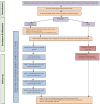Safety and adherence to medications and self-care advice in oncology (SAMSON): pilot randomised controlled trial protocol
- PMID: 39043598
- PMCID: PMC11268069
- DOI: 10.1136/bmjopen-2023-079122
Safety and adherence to medications and self-care advice in oncology (SAMSON): pilot randomised controlled trial protocol
Abstract
Introduction: With the increasing use of oral anti-cancer medicines (OAMs), research demonstrating the magnitude of the medication non-adherence problem and its consequences on treatments' efficacy and toxicity is drawing more attention. Mobile phone interventions may be a practical solution to support patients taking OAMs at home, yet evidence to inform the efficacy of these interventions is lacking. The safety and adherence to medications and self-care advice in oncology (SAMSON) pilot randomised control trial (RCT) aims to evaluate the acceptability, feasibility and potential efficacy of a novel digital solution to improve medication adherence (MA) among people with cancer.
Methods and analysis: This is a two-arm, 12-week, pilot RCT aiming to enrol 50 adults with haematological, lung or melanoma cancers at an Australian metropolitan specialised oncology hospital, who are taking oral anti-cancer medicines. Participants will be randomised (1:1 allocation ratio) to either the intervention group (SAMSON solution) or the control group (usual care). The primary outcomes are the acceptability and feasibility of SAMSON. The secondary outcomes are MA, toxicity self-management, anxiety and depressive symptoms, health-related quality of life, and parameters relating to optimal intervention strategy. Quantitative data will be analysed on a modified intention-to-treat basis.
Summary: While multicomponent interventions are increasingly introduced, SAMSON incorporates novel approaches to the solution. SAMSON provides a comprehensive, patient-centred, digital MA intervention solution with seamless integration of a mobile platform with clinical consultations that are evidence-based, theory-based, co-designed and rigorously tested. The pilot trial will determine whether this type of intervention is feasible and acceptable in oncology and will provide a foundation for a future full-scale RCT.
Ethics and dissemination: Primary ethics approvals were received from Peter MacCallum Cancer Centre and Swinburne University of Technology Human Research Ethics Committees (HREC/95332/PMCC and 20237273-15836). Results will be disseminated via peer-reviewed publications and presentations at international and national conferences.
Trial registration number: The protocol has been prospectively registered on the Australian New Zealand Clinical Trials Registry with trial registration number (ACTRN12623000472673).
Keywords: ONCOLOGY; ORAL MEDICINE; Randomized Controlled Trial; Safety; Telemedicine.
© Author(s) (or their employer(s)) 2024. Re-use permitted under CC BY-NC. No commercial re-use. See rights and permissions. Published by BMJ.
Conflict of interest statement
Competing interests: None declared.
Figures


References
-
- Osterberg L, Blaschke T. Drug therapy: adherence to medication. N Engl J Med. 2005;353:487–97. - PubMed
Publication types
MeSH terms
Substances
LinkOut - more resources
Full Text Sources
Medical
